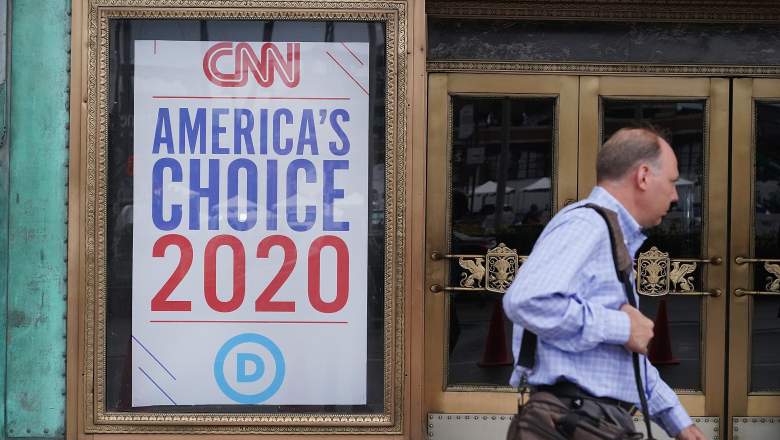
Getty
Tonight marks the second round of Democratic debates, this time in Detroit, and all eyes are going to be on the candidates tonight. But just how much time do you need to put aside for the debates tonight? Here are the details you need to know.
Tonight we’re watching the first of two back-to-back Democratic debates for the 2020 Democratic nomination for President. The debate is supposed to be two hours long, beginning at 8 p.m. Eastern and ending at 10 p.m. Eastern, but it looks like it’s going a little long. The debate is being broadcast on CNN, and CNN has set aside three hours for the debate, with the broadcast ending at 11 p.m. Eastern. So although the debate is supposed to be just two hours long, CNN has allotted time for the debate to go longer if needed. And it looks like that’s going to happen.
(Note: If you’re looking for the July 31 debate length, see Heavy’s story here. Essentially, it’s expected to be about as long as July 30’s debate, which ended around 10:30 p.m. Eastern.)
CNN left room on the schedule for a slightly longer debate if needed, which is why your DVR likely had three hours set aside for the debate. It’s currently almost 10 p.m. Eastern and they haven’t started the closing statements yet, so the debate will indeed go a little longer tonight. According to CNN’s schedule listed on TV Guide, it shouldn’t last any longer than 11 p.m. Eastern.
Any news station you turn to after the debate is over will have plenty of recaps and reviews of the debate. So if you’re planning to host a watch party for this debate, then you might want to budget some time for an after-show too, even if you don’t want to continue watching CNN. For example, Stephen Colbert’s The Late Show will air earlier than normal tonight, starting live immediately after the debate ends. The Daily Show with Trevor Noah will also air live immediately after the debate.
The lineup for tonight’s debate includes Marianne Williamson, John Delaney, John Hickenlooper, Tim Ryan, Steve Bullock, Amy Klobuchar, Beto O’Rourke, Pete Buttigieg, Elizabeth Warren, and Bernie Sanders.
How are these candidates doing in the polls so far? According to 538, a Morning Consult poll for July 22-28 placed Sanders second at 18 percent and Warren third at 13 percent. O’Rourke got 3 percent, Buttigieg got 5 percent, Williamson 1 percent, Delaney 1 percent, Hickenlooper 1 percent, Ryan 1 percent, Bullock 0 percent, and Klobuchar 1 percent. So there’s a pretty significant difference between the top two and the rest, although Buttigieg and O’Rourke are still doing pretty well.
Meanwhile, a California-based Public Policy Institute poll for July 14-23 was a little different, placing Warren at 15 percent and second place, Sanders at 12 percent, and Buttigieg at 5 percent.
A HarrisX poll for July 27-29 put Sanders in second place at 15 percent, followed by Warren at 9 percent. Also from tonight’s debate were Williamson at 0 percent, Delaney at 1 percent, Hickenlooper at 0 percent, Ryan at 1 percent, Bullock at 0 percent, Klobuchar at 1 percent, O’Rourke at a higher 4 percent, and Buttigieg at a decent 3 percent.
In general, Sanders and Warren typically rank in the top five in most recent polls, with Buttigieg and O’Rourke sometimes placing up there or near the top five too.
After this, the next debates will be in Houston in September. Depending on how many qualify, we could have one or two nights of debates. So far, seven people have qualified for the September debates, and there’s some controversy over whether Yang should be the eighth. To be in the third and fourth debates in September and October, candidates must get donations from 130,000 people and get at least 2 percent in polls from four DNC-approved polls within a limited window. Some think that the field may be cut in half due to the more stringent requirements.
READ NEXT: Andrew Yang & DNC at Odds Over Qualifying Polls: He Still Needs One More for Fall Debates